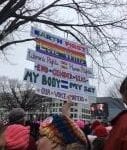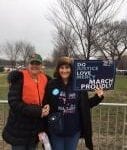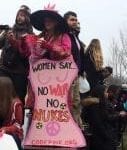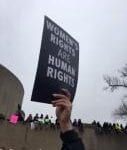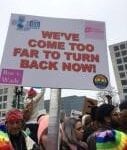Written by Thu Tran, MD,FACOG
January 25, 2017

Oh, where have you been, my blue-eyed son?
And where have you been my darling young one?
I’ve stumbled on the side of twelve misty mountains
I’ve walked and I’ve crawled on six crooked highways
I’ve stepped in the middle of seven sad forests
I’ve been out in front of a dozen dead oceans
I’ve been ten thousand miles in the mouth of a graveyard
And it’s a hard, it’s a hard, it’s a hard, and it’s a hard
It’s a hard rain’s a-gonna fall.
Last October, Bob Dylan won the Nobel Prize in Literature, because the Nobel committee recognized his profound influence in music and how he has been an icon in the world of “secondary literature.”
Mr. Dylan decided not to show up to receive his award. Instead, he wrote a speech to be given at the award banquet. The Nobel committee did not even hear from him for several weeks after the award was announced and thought he was rude and arrogant.
In this banquet speech, Dylan explained how, even when he became more well known as a song writer, as he started writing songs as a teenager, he never dreamed big about how his songs would turn out. He finally achieved great success with his songs, winning awards, singing to huge crowds around the world. He realized, however, that the essence of his song writing is how the songs affected people in positive way all over the world. It’s what his songs have done for others, not for him, that’s important.
“Not once have I ever had the time to ask myself, ‘Are my songs literature?’ “ Dylan wrote. He did not let his ego sway him from the truth of why he wrote these songs.
Dylan and most true geniuses in different fields, as I love his songs and consider him a “genius song writer,” pursue their passion purely for the passion and find gratification when their work affects others positively. They do not feel they need to be at the center of admiration for their work. Instead, Dylan is known for being an elusive figure, hidden from the public most of the time, with no need to have an enormous crowd confirm how talented or fantastic he is.
Reading Bob Dylan’s Nobel banquet speech made me reflect on the Women’s March in Washington, DC last Saturday. I marched with a large group of women physicians and friends, some conservative and some liberal. We all agreed it was an incredibly moving experience. I had never been in such an enormous gathering where at times, we could not move at all.
One of my friends became “claustrophobic,” at a certain moment. We had to clear a path for her to reach a grassy area for more air. It was an incredibly peaceful march with no major incidents of injury or death. I have participated in three marathons and, in two out of three, somebody died. It probably would have been unusual to have a heart attack while you can’t move in the crowd at the pace of a snail, but something horrific could have happened as in a sport game where spectators could have trampled on each other. Instead, gentle men and women were helping me and my friends climb over some barriers when we needed more space or needed to change directions. We collided hard into others many times and everyone was smiling and understanding. For those who are religious, it probably was like God was watching over us, where the almighty made sure the marchers delivered their messages safely and profoundly in this sea of people, from all ages, races, genders, and religions. It was a walk of the spirits.
Like many of Bob Dylan’s songs, we were representing our truth with our march. We were not the center of admiration or attention. We all were marching for, and with one another. My friends and I recognize we live in a safe bubble within the Washington suburbs where most people are educated, have a more than adequate lifestyle with wealth, freedom to pursue their passions, and good healthcare. Our footsteps last Saturday were dedicated to our marginalized brothers and sisters whose lives need to be lifted in an honest way. I was marching for my patients whose healthcare might be jeopardized. I was marching for the rural people and inner city people whose children’s education need to improve in order for them to have a place at society’s table. I was marching for future generations to have clean air, fresh water, a sustainable environment they deserve from those who brought them into the world.
Like Dylan, the marchers did not do so to have their posters be the best posters of all, their chants be the best heard of all, their crowd be the biggest one of all. We marched with the clear truth inside each of us, of who we were and how we wanted to represent ourselves to the world. As in the Quaker’s tradition, I marched as a way to let my life speak.
Among the biggest gifts my son’s Quaker education has given me is the knowledge of what truth means. In Robert Lawrence Smith’s “A Quaker Book of Wisdom,” the third chapter has always stood out among the most important ones, the chapter on TRUTH. Smith reminded us how our life should be guided by an inner voice of truth. How do we distinguish this inner voice from the “internal chorus that calls out to us–the voices of self-interest, of vanity, of selfish pleasure?” Smith asked.
The Quakers believe there is “That of God in everyone.” By listening to our inner voice, where truth is the best of us that will guide us toward our God and the good, we will then live a righteous life. Quakers believe in silence do we find truth. Contemplation before speaking brings out wisdom. In Quaker meetings, attendants remain silent until they are moved to speak their inner truth.
Last Saturday, many of us had the courage to represent our truth or our inner light, with the understanding that it might not be the inner voice of others. Many might have thought we were marching with no real purpose or direction, no real understanding or action. We were not, however, truth seekers or wanderers. We knew our truth. We were letting our inner light guide us through the march. We let our life speak, in unity. Like Bob Dylan, who did not write songs so that he could win the Nobel prize in Literature, my friends and I were not marching to get our work noticed for the Nobel prize in Medicine. We were marching to hopefully improve or prolong life for our patients, one patient at a time.
Don’t you think Bob Dylan, like the famous writers he admires such as Kipling, Shaw, Albert Camus, Thomas Mann, Pearl Buck and Ernest Hemingway, has such wisdom, understanding and a sense of “prophecy” in his words to the listeners? Maybe that’s why he’s a genius of a writer in himself and deserves to win the Nobel Prize in Literature. Or, could it be that humans, in all their predictable fallacies, always seem to repeat their history?
Come gather around people
Wherever you roam
And admit that the waters
Around you have grown
And accept it that soon
You’ll be drenched to the bone.
If your breath to you is worth saving
Then you better start swimming or you’ll
sink like a stone
For the times they are a-changing.
Come writers and critics
Who prophesize with your pen
And keep your eyes wide
The chance won’t come again
And don’t speak too soon
For the wheel’s still in spin
And there’s no telling who that it’s naming.
For the loser now will be later to win
For the times they are a-changing.
Come senators, congressmen
Please heed the call
Don’t stand in the doorway
Don’t block up the hall
For he that gets hurt
Will be he who has stalled
There’s a battle outside raging
It’ll soon…
Tags:



